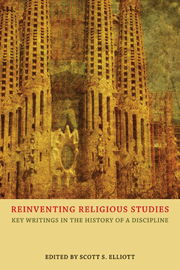Book contents
- Frontmatter
- Contents
- Introduction
- 1 For such a time as this: the Council of Societies for the Study of Religion, 1969–2009
- Part I Inventing and reinventing the field of religious studies
- Part II Method and theory in religious studies
- Part III Teaching religion
- 14 Confessions of a former establishment fundamentalist
- 15 Confessing away the soul with the sins, or the risks of Uncle Tomism among the humanists: a reply to Robert Bellah
- 16 Criteria for organizing the introductory course in religion
- 17 Teaching about religion at the state university: taking the issue seriously and strictly
- 18 Teaching about religion at the state university: a reply
- 19 Teaching about religion at the religiously affiliated university: taking the issue seriously and strictly—a reply to Robert Baird and Robert Minor
- Part IV Women and the bible in religious studies
- Part V Religion and religious studies in civic life
- Part VI Religious studies and identity politics
- Part VII Islam and 9/11
- Bibliography
- Acknowledgments
- Index
15 - Confessing away the soul with the sins, or the risks of Uncle Tomism among the humanists: a reply to Robert Bellah
from Part III - Teaching religion
- Frontmatter
- Contents
- Introduction
- 1 For such a time as this: the Council of Societies for the Study of Religion, 1969–2009
- Part I Inventing and reinventing the field of religious studies
- Part II Method and theory in religious studies
- Part III Teaching religion
- 14 Confessions of a former establishment fundamentalist
- 15 Confessing away the soul with the sins, or the risks of Uncle Tomism among the humanists: a reply to Robert Bellah
- 16 Criteria for organizing the introductory course in religion
- 17 Teaching about religion at the state university: taking the issue seriously and strictly
- 18 Teaching about religion at the state university: a reply
- 19 Teaching about religion at the religiously affiliated university: taking the issue seriously and strictly—a reply to Robert Baird and Robert Minor
- Part IV Women and the bible in religious studies
- Part V Religion and religious studies in civic life
- Part VI Religious studies and identity politics
- Part VII Islam and 9/11
- Bibliography
- Acknowledgments
- Index
Summary
In the December 1970 issue of this Bulletin, Robert Bellah makes two eloquent appeals. One is for humility, rather than arrogance, in the study of religion; the other is for an inductive approach that starts with respectful attention to experience rather than with conceptual schemes. His testimony was so ardent that it led the editor, understandably, to use a title that cast the paper in the mode of conversion and confession: “Confessions of a Former Establishment Fundamentalist.”
In fact, the ardor of the confessions is so great that the author could easily be misunderstood as renouncing not only the twin sins of arrogance and abstraction, but also the scientific enterprise of making interpretive generalizations about religion within the social scientist's frame of reference. This seems to be exactly what happened the last time Bellah addressed similar confessions to a similar audience, in his Sanders Theatre address to an AAR-SSSR meeting October 25, 1969 (published, with responses, in Bellah 1970a, and alone in Bellah 1970d). The delighted applause of the humanists and the angry sense of abandonment expressed by the social scientists suggested that all thought they had witnessed the capitulation of social science to humanistic study. Bellah had to add a rejoinder saying this wasn't so. And he interposes occasional remarks in his present “confessions” to the same effect. But these we may judge from the concluding remarks about de-differentiating the disciplines.
- Type
- Chapter
- Information
- Reinventing Religious StudiesKey Writings in the History of a Discipline, pp. 95 - 98Publisher: Acumen PublishingPrint publication year: 2013



